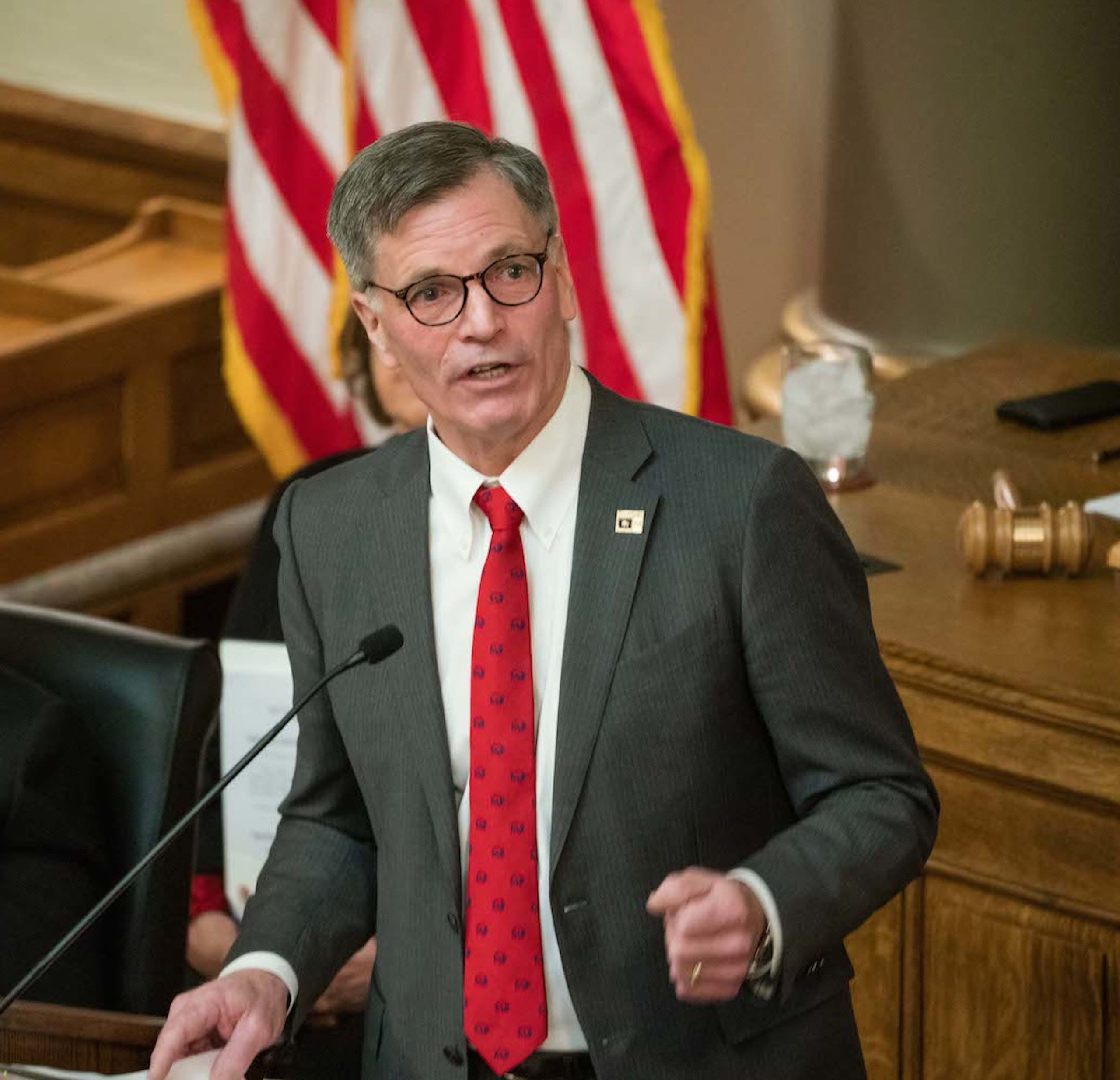
By Hannah Shields
Wyoming Tribune Eagle
Via- Wyoming News Exchange
CHEYENNE — A budget to fund Wyoming state government for the next two years was signed into law Saturday morning by Gov. Mark Gordon, hours before the midnight deadline.
The governor had the final say on which amendments would be vetoed in the 2025-26 biennium spending plan, since the Wyoming Legislature submitted the budget on the last day of the session, March 8.
In a typical budget session, the final week is used to submit a budget to the governor, and he usually has three days in which to sign it or use his line-item veto authority. On the final day of the session, lawmakers can vote to override any of the governor’s vetoes.
Since lawmakers are out of session, however, Gordon’s word was final.
“Last year, in my budget veto letter, I congratulated both chambers on passing a budget in record time — all while increasing transparency. It is unfortunate this session did not follow suit,” Gordon wrote in this year’s budget veto letter. “Over 300 amendments to this one bill, some of which were introduced to save legislation that failed earlier in the session, almost caused the budget bill to share the same fate.”
Gordon ensured the budget included a number of priorities that were outlined in his State of the State speech on the first day of the 20-day session. Some of those included funding for the 988 suicide prevention hotline, funding K-12 school construction, supporting mental health services and funding large energy projects.
“This budget addresses our challenges and positions Wyoming for a prosperous future,” Gordon said in a Saturday news release. “We are fighting federal overreach, advancing our industries, providing practical property tax relief, ensuring adequate funding for our schools, counties, and communities and providing the services Wyoming residents expect.”
UW Diversity, Equity and Inclusion programs
The University of Wyoming’s Office of Diversity, Equity and Inclusion (ODEI) will no longer receive state aid as of July 1. Gordon kept this section of the budget footnote, but, at the same time, made sure diversity, equity and inclusion (DEI) programs, functions and activities at the university continue to receive funding.
The governor said he recognized the Legislature’s intent, but worried the second part of the footnote defunding DEI-related programs jeopardized the “millions of dollars of federal grants that regularly flow to the University.”
Gordon also gave the Board of Trustees the flexibility to use donor and matching funds for research.
“Clearly, Wyoming need not pursue any ‘woke’ agenda, and I have encouraged the University to drop such nonsense,” Gordon wrote in his veto letter.
However, he still recognized that “these (federal) grants are vital to research and other core purposes of the University.”
The budget cut $1.73 million in block grant aid to the university, which would normally fund UW’s ODEI. UW President Edward Seidel said in an emailed statement that this “will require us to rethink or change the way we do things.”
“We certainly will continue to value and serve students, employees and community members of all genders, ethnicities and backgrounds, and work to make everyone feel welcome,” Seidel said in the statement. “But the message from lawmakers, regardless of the welcomed line-item veto from the Governor, is that our DEI efforts must change, and discussions are underway to determine the best path forward.”
Seidel said the university will appoint a working group of faculty, staff and students to scour through all of UW’s programs and activities. Members of the working group will determine what programs and activities “can and should be continued,” as well as explore non-state funding sources to support some “essential” functions.
“Our role as Wyoming’s land-grant and flagship university is paramount, and we are committed to serving the state to the best of our ability,” Seidel said.
K12 school construction
There is already approximately $41.7 million secured for the construction of a new elementary school in Laramie County School District 1, allocated from the 2023 supplemental budget. These funds are contingent upon the results of a most cost-effective remedy (MCER) study, which is currently underway.
Funding for school capital construction projects was kept intact in the final budget for the 2025-26 biennium, and it includes the design and construction of a second new elementary school in LCSD1. It is important to note that funding for all school capital construction projects is contingent upon the completion of MCER studies. These studies determine the prioritization of any major maintenance or construction projects for school districts.
Gordon struck language from the budget that suggested his office prioritizes school construction projects not included in the School Facilities Commission’s budget recommendation.
In his veto letter, the governor recognized the need for new high schools in Campbell and Sweetwater counties, but said neither project has qualified for design and construction under the standard facility prioritization process, to his knowledge.
“I am not vetoing the project, I am only vetoing any implication that I support the Legislature deviating from the standard prioritization process for the construction of school facilities,” Gordon wrote. “I do recognize the statutes allow for long-range planning, and this would seem to be important to do with these two extraordinarily large and potentially very expensive high school remedies looming on the horizon.”
Separation of powers
Gordon vetoed a budget section that provided for legislative intervention into state employee salary increases in the executive branch. The governor said this section was an encroachment by the Legislature on the separation of powers.
“My long-held concerns with the constitutionality and functionality of this budget language are only increasing,” Gordon wrote. “The fiscal control intended by this section is something that already exists in rule.”
State employee salary increases and compensation benefits are already overseen by the director of the Budget Department, director of Department of Administration and Information and the Human Resource Division administrator. Any increase above what the Legislature approved is already required to be submitted as an exception request in a state agency’s budget under current Wyoming statute.
“This provision infringes on the separation of powers and encroaches upon the inherent prerogative of the executive branch,” Gordon wrote. “This is contrary to my budget recommendation authority, as it removes my discretionary power relating to the next biennial budget.”
Since the Legislature only approved 25% of his total recommendation to fund employee raises within the executive branch, the governor also removed language that directed the appropriation of such funds.
“Given the limited amount of funds, it is imperative that the executive branch develop a distribution method to optimize this allocation in a fair manner,” Gordon wrote.
He also vetoed a section that required him to identify and eliminate 24 full-time vacant positions in the executive branch. He said this was another encroachment of the Legislature “upon the inherent prerogatives of the executive branch.”





